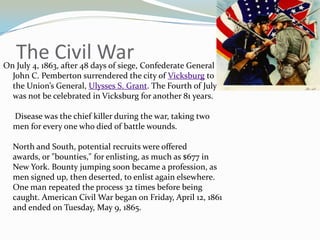
The civil war
- 1. The Civil War On July 4, 1863, after 48 days of siege, Confederate General John C. Pemberton surrendered the city of Vicksburg to the Union’s General, Ulysses S. Grant. The Fourth of July was not be celebrated in Vicksburg for another 81 years. Disease was the chief killer during the war, taking two men for every one who died of battle wounds. North and South, potential recruits were offered awards, or "bounties," for enlisting, as much as $677 in New York. Bounty jumping soon became a profession, as men signed up, then deserted, to enlist again elsewhere. One man repeated the process 32 times before being caught. American Civil War began on Friday, April 12, 1861 and ended on Tuesday, May 9, 1865.
- 2. The Civil War Andersonville Prison in southwest Georgia held 33,000 prisoners in 1864. It was the fifth largest city in the Confederacy. •By the end of the war, Unionists from every state except South Carolina had sent regiments to fight for the North. • On November 9, 1863, President Lincoln attended a theater in Washington, D.C., to see "The Marble Heart." An accomplished actor, John Wilkes Booth, was in the cast. • On March 4, 1865, Lincoln was inaugurated for a second term. Yards away in the crowd was John Wilkes Booth with a pistol in his pocket. His vantage point on the balcony, he said later, offered him "an excellent chance to kill the President, if I had wished." • On May 13, 1865, a month after Lee’s surrender at Appomattox, Private John J. Williams of the 34th Indiana became the last man killed in the Civil War, in a battle at Palmito Ranch, Texas. The final skirmish was a Confederate victory. • Hiram Revels of Mississippi became the first black man ever elected to the U.S. Senate. He filled the seat last held by Jefferson Davis
- 4. THE CIVIL WAR . One-third of the soldiers who fought for the Union Army were immigrants, and nearly one in 10 was African American. The Union Army was a multicultural force—even a multinational one. We often hear about Irish soldiers (7.5 percent of the army), but the Union’s ranks included even more Germans (10 percent), who marched off in regiments such as the Steuben Volunteers. Other immigrant soldiers were French, Italian, Polish, English and Scottish. In fact, one in four regiments contained a majority of foreigners. Blacks were permitted to join the Union Army in 1863, and some scholars believe this infusion of soldiers may have turned the tide of the war
- 5. . More men died in the Civil War than any other American conflict, and two-thirds of the dead perished from disease. Approximately 625,000 men died in the Civil War, more Americans than in World War I, World War II, the Korean War and the Vietnam War combined. If the names of the Civil War dead were arranged like the names on the Vietnam Memorial, it would stretch over 10 times the wall’s length. Two percent of the population died, the equivalent of 6 million men today. Rifles were by far the war’s deadliest weapons, but deadlier still was disease. In 1861, as armies massed, men once protected from contagion by isolation marched shoulder to shoulder and slept side by side in unventilated tents. Camps became breeding grounds for childhood diseases such as mumps, chicken pox and measles. One million Union soldiers contracted malaria, and epidemics were common